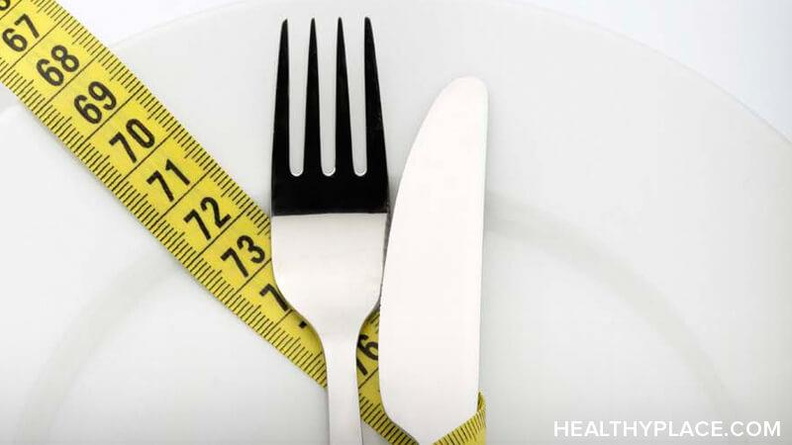Cope with Eating Disorder Triggers Using the STOP Skill

You can cope with eating disorder triggers even though, as I often describe an eating disorder, there is a stubborn, little monster in the back of your head. It may lay dormant for days, months, even years, but when it arises, it wreaks havoc.
In high school, I dealt with anorexia nervosa and was lucky enough to escape its full grasps after years of playing a back and forth game with the little monster in my head. Still, I experience triggers weekly, particularly when I am already feeling stretched taut emotionally. I have learned to foster a friendlier relationship with the monster in my head, but we have our ups and downs. Lately, I have been spending more time with a friend who is slipping into her own disordered eating patterns. I find that this impacts me, and my monster rears its head, wanting to re-insert itself. I find myself counting calories and drastically restricting what I eat. To cope with these feelings, here is one strategy I use to cope with eating disorder triggers in the moment.
How to Cope with Eating Disorder Triggers Using Distress Tolerance
I am currently in intensive training to become a dialectical behavior therapist. Dialectical behavior therapy, also known as DBT, is commonly used to treat individuals diagnosed with borderline personality disorder. However, since this treatment focuses on skills, it can be applied to many different disorders and emotional situations. One significant aspect of this treatment module is distress tolerance, and I have found that this aspect of DBT has woven itself into my personal life. One distress tolerance skill I like in particular is what therapists call the STOP skill. This acronym, which I will break down below, has come in handy when I feel my eating disorder symptoms cropping up, even ever so slightly.
Use the STOP Skill to Cope with Eating Disorder Triggers
Here's how to use the STOP skill to cope with your eating disorder triggers:
Stop!
Quite literally freeze and stop what you are doing. Do not react. Often when I am feeling triggered, I want to lash out at those around me. I have found myself wanting to leave the room aggressively or making a snide remark to a friend who is triggering me. This behavior of mine is what I call escape/avoidance behavior, and it does not help solve the situation. By fleeing the scenario, I am not learning the necessary tools that would allow me to cope in the moment.
Take a Step Back
Mentally take a step back and remove yourself from the situation in your mind. This action can be done by focusing intently on your breathing. I often find that when I am feeling triggered, my breath stops or becomes short, leading to a pain in my chest. By pausing your mind, you are preventing yourself from letting your emotions take the driver's seat and guide the situation.
Observe
Observe what is going on both inside and outside of you. Focus on what emotions you are feeling and describe them in your head. During a triggering moment, my feelings go haywire, and I cannot always pinpoint just exactly what I am feeling. Am I feeling threatened by this triggering content? Am I feeling frustrated at myself for re-experiencing these feelings? Research shows that taking a moment to focus on your emotions, as opposed to instantly pushing them away, can lead to a reduction in these negative feelings in the long run.
Proceed (Mindfully)
At this moment, you should ask yourself what actions would make the situation better or worse. For example, will acting impulsively lead to your long-term goal? In my experience, acting on my impulses may feel good at the moment, but often leads to additional emotional turmoil in the long-run. Although restricting calories or purging may give you back a sense of control in the short-term, this behavior will not necessarily help you meet your goals in the long-term.
What skills do you use to cope with eating disorder triggers?
APA Reference
O'Grady, H.
(2019, August 5). Cope with Eating Disorder Triggers Using the STOP Skill, HealthyPlace. Retrieved
on 2025, April 19 from https://www.healthyplace.com/blogs/relationshipsandmentalillness/2019/8/cope-with-eating-disorder-triggers-using-the-stop-skill